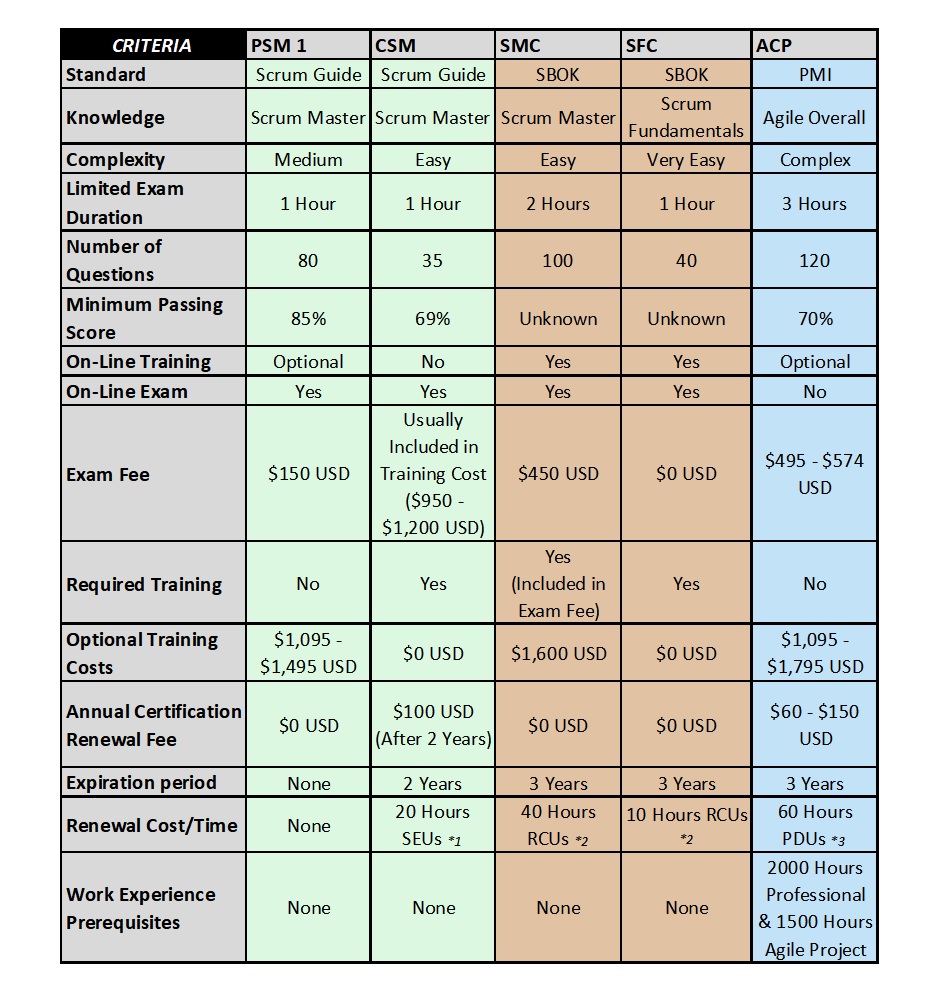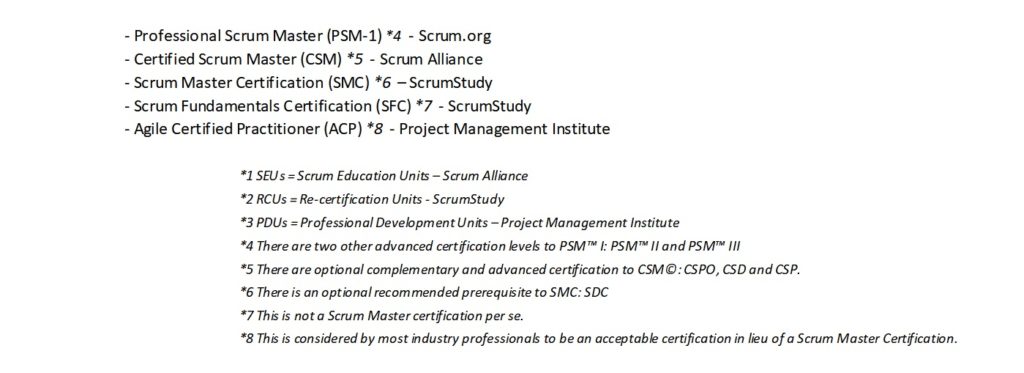Are you in a hurry to get certified? Which one is the fastest to obtain? On a budget? Which one is the most economical? When it comes to time and money, which one provides you the best value?
These questions may seem simple and straight forward, but they are not easy to answer given there are several different institutions that offer scrum master certification and the preparation steps, time, and costs are significantly different from each other.
In this article, I provide information about some of the most popular Scrum Master certification programs available. If you are pressed for time, on a budget, or looking for the best value based on a combination of the two, I point out the unique differences between them all so you can make an informed decision on which certification would best serve you.
Let’s start with the most popular Scrum Master Certifications based on the Scrum Guide.
PSM™:
Scrum.Org’s Professional Scrum Master level I (PSM I) certification exam can be taken directly. The cost of the exam is $150.00 USD. You do not have to take any training courses and there are no prior prerequisites for taking the exam other than paying for the exam (or “assessment”) fee, however, passing the exam requires a reasonable amount of preparation. A 2-day Professional Scrum Foundations or Professional Scrum Master course is highly recommended to help you prepare for the exam and gain a stronger understanding of Scrum. The cost of a 2-day course ranges anywhere from $1,095.00 to $1,495.00 USD. There are two other advanced levels of PSM™ (PSM II and PSM III) and Scrum.org supports other related Scrum certifications and courses, such as the Professional Scrum Foundations (PSF), the Professional Scrum Product Owner (PSPO), and the Professional Scrum Developer (PSD), etc.
PSM™ exam questions & time = 80 / 1 Hour (A passing score is 85% or above.)
CSM©:
For CSM©, most authorized Scrum Alliance trainers charge in the range of $950.00 USD and $1,200.00 USD for taking the required 2-day Certified Scrum Master© training course. You need to take the required training before you can take the exam. The exam fee for the CSM© could cost you $150.00. There is also an initial 2-year membership fee of $200.00 USD. The cost of some (if not most) CSM© training courses include the exam fee and sometimes the membership fee as well. After you complete the 2-day training, the service posts and validates this to Scrum Alliance. Once this is done, you can take the online exam – usually the very next day. To sum it up, the cost of the Scrum Alliance CSM© certification ends up being the most expensive yet one of the fastest and easiest means for obtaining a Scrum Master type certification. Scrum Alliance supports other related Scrum certifications and courses, such as the Certified Scrum Product Owner (CSPO), the Certified Scrum Developer (CSD), and the Certified Scrum Professional (CSP), etc.
CSM© exam questions & time = 35 / 1 Hour. You must correctly answer 24 of the 35 questions. (This is an equivalent to a passing score of 69% or above.)
FSC:
When it comes to SBOK, one option would be to take the Scrum Fundamentals Certification© (FSC) by ScrumStudy. The reason I mention this (and the only reason I mention ScrumStudy at all in this article) is that if your future employer only requires that you understand the basics about the Scrum Master’s role and responsibility, then this may be the only certification you will need to meet that requirement. And if this is your objective, this is probably the most readily available, least expensive and least time consuming “Scrum related” certification.
ScrumStudy does not charge for the training and exam for this certification, but it is important to note that the Scrum Fundamentals Certification is not a Scrum Master certification per se – but more of a scrum foundational certification. In short, it’s ScrumStudy’s complementary introductory course to its other Scrum “fee-based” training offers, certification, and exam services. The fact that SFC is not a Scrum Master certification may not be an issue if the position you are applying for only expects you to have a reasonable understanding of the fundamentals of Scrum – and what a scrum master does.
SFC exam questions & time = 40 / 1 Hour (ScrumStudy does not publicly disclose the minimum passing score for this exam.)
SMC:
ScrumStudy does offer a training and certification program for a scrum master certification and they call it simply the Scrum Master Certification© (SMC). This is ScrumStudy’s more advanced training and exam offering than the FSC. The time and expense for this certification are comparable to any of the other Scrum Master certification options like the CSM© or PSM™. But its popularity in comparison to CSM© or PSM™ is a matter of opinion. SMC training is online, and the exam fee is $450.00 USD. You must pay the exam fee in advance before you can access the online training. There are also ScrumStudy certified independent instructor lead workshops for the SMC exam prep that you can take. These workshops can cost up to $1,600.00, but if you take the SMC training and exam alone – without the recommended SDC prerequisite (which I address next) and skip any costly workshops fees, you can complete the certification at the cost of the exam fee.
SMC exam questions & time = 100 / 2 Hours (ScrumStudy does not publicly disclose the minimum passing score for this exam.)
(Optional) SDC:
SDC is ScrumStudy’s optional but recommended training and certification prior to taking SMC. Therefore, ScrumStudy recommends (but does not require) you to take their Scrum Development training as a prerequisite to the SMC training and exam. If you do decide to take it, the Scrum Development Certification© (SDC) exam will cost you $200.00. Like the SMC, you must pay the exam fee in advance before you can access the online training.
Optional SDC exam questions & time = 75 / 1.5 Hours (ScrumStudy does not publicly disclose the minimum passing score for this exam.)
When it comes to ScrumStudy certification time considerations, the shortest path is to take the online SMC exam without the SDC prerequisite – or the FSC at that matter. The SMC registration should take less than 15 minutes and the exam alone would take about 2 hours. This is not taking into consideration the time you should spend in preparation for the exam. For folks interested in a quick and cheap approach (considering they are a quick study for these kinds of exams) the cost would be $450.00 USD, and the time would be anywhere in the range of 4 to 8 hours, but the more realistic time investment would be somewhere in the range of 3 to 4 days. If you decide to go this route and don’t pass the exam the first time, you can take it again two more times for free (so they say) – but this would undoubtedly increase your timeline for certification. On the other hand, if you invest some quality time in preparation for the exam you mitigate your risk of having to take the exam more than once.
Now if you consider the time and cost of taking all of ScrumStudy’s optional prerequisites for the SMC (like obtaining the FSC and DSC certifications back to back), the SMC will take you approximately two weeks and will cost you a total of $650.00 USD without attending a training workshop, and around $2,250.00 USD if you decide to attend additional ScrumStudy training workshops from a certified ScrumStudy trainer prior to taking the exam.
It is also important to note that the SMC certification is based on the framework outlined in the SBOK (Scrum Book of Knowledge, published by SCRUMStudy – SCRUMStudy is owned by VMEdu, Inc). This is not the same thing as the Scrum Guide (the official text by the creators of Scrum).
The value of the SMC certification is questioned by many important members and organizations in the Scrum community. Most popular Scrum scaling frameworks such as SAFe, LeSS or Nexus are based on the Scrum Guide and do not recognize SBOK.
ScrumStudy only publishes the pass rate of its exams and not the minimum passing score. Their current pass rate for the SMC (as of the date of this article) is 95%, but this is not the same thing as the minimum passing score – which is the number of questions you need to answer correctly to pass the exam. All the other popular Scrum Master certifications publish their minimum passing score.
ACP:
The Project Management Institute has an Agile Certified Practitioner certification. The cost of the exam or PMI-ACP is $435.00 if you are a PMI member. The cost of the first year PMI membership is $139.00 and is $129.00 USD for its annual membership thereafter, so the combined cost for the membership (as a new member) and exam fee is $574.00. Although having a PMI membership is not required to take the ACP exam, it is important to note that the non-membership exam fee is $495.00 ($60.00 more without PMI membership). It is also important to note that the ACP certification is not a “Scrum” certification per se, but the tools and techniques outlined in its certification framework addresses a comprehensive list of Scrum and other agile framework related topics. It is also important to note that the PMI-ACP certification program has the most demanding exam prerequisites and requirements in comparison to PSM™ (Scrum.org), CSM© (Scrum Alliance) or any of the other Scrum Master certification options. It also adds up to be quite time consuming and costly to obtain the required ACP exam prerequisites when you consider its registration and training preparations (filling out the form, the cost for self-study books and/or taking an exam preparation workshop, etc.). You also need to take into consideration the additional education and work experience requirements in order to qualify to take the exam – 21 Hours (called Professional Development Units, or PDUs) of Agile-related training, 2000 hours of professional experience on a project team – (or a PMP certification in lieu of), and 1500 hours of professional agile project related experience. And your application information may be subjected to an audit. An ACP exam prep workshop could range anywhere from $1,095.00 – $1.795.00 USD.
ACP exam questions & time = 120 / 3 Hours. (A passing score is 70% or above.)
Summary:


In a cost comparison, if you remove the need for taking a prerequisite course, the ACP is a little less expensive to obtain than Scrum Alliance’s CSM© certification and the Scrum.Org’s PSM™ certification is less expensive than both the CSM and ACP.
As for expediency and convenience, since Scrum.Org does not have registration prerequisites or required courses prior to taking the PSM™ exam, the process to take this assessment is much faster and easier compared to all the other Scrum Master certification options outlined in this article.
The PSM™ exam is much harder than the CSM© but much easier than the ACP. As mentioned earlier, the CSM© requires you to take a prerequisite training course led by a certified trainer before you can take the exam – this helps of course in preparing you for passing the exam. As for the ACP, Project Management Institute does not require a prerequisite training course per se but does require stringent work experience prerequisites and some training hours within guidelines (i.e. a minimum of 21 PDUs) before you can qualify to take the exam. By the way, many folks take an exam workshop that qualifies to fulfill these PDUs.
It is also important to note that the ACP certification enforces a broader range in the knowledge of Agile-related tools, techniques, frameworks, and methodologies than a Scrum Master certification per se. For some organizations, this may be the most important aspect of the certification. Other organizations may neither care nor be aware of the difference.
As for exam preparation time, although there are no strict prerequisites for training and education for the PSM™ or ACP, if you don’t prepare adequately for either of these exams (adding the investment of time and/or cost for training and education) your odds are greater that you will not pass them the first time. So, in my opinion, it would be wise to invest the extra time and cost in preparation for these exams since the exam fees for these certifications are quite substantial. And note that since the ACP exam is more extensive than the PSM™, the ACP will require the investment of more exam study and preparation time.
Finally, you need to consider the expenses for maintaining your certification once you get it – that is, the cost of certification renewal fees which includes the time and cost of ongoing education requirements. (See the comparison table above.) When you combine the cost of maintaining the certification with the difficulty of the exam and the cost for taking the assessment, most professionals say the PSM™ has a better price to quality ratio than the CSM©, the SMC, and to some degree, the ACP.
One more thing to consider regarding the value of adding a scrum master certification to your resume…
“An organization’s value and preference of any particular Scrum related certification depends highly on its culture, experience, and awareness of the value of Scrum.”
I hope this helps, and good luck on making your final decision!
Ken Schwaber left the Scrum Alliance and founded Scrum.org. The PSM™ certification of Scrum.org is different than CSM®️ certification although both certifications derive from the Scrum Guide. For PSM™ certification, attending a workshop is not mandatory but it is a little harder to clear the assessment than the CSM®️ which at least assures a precise level of Scrum understanding.


Thanks for sharing!
I agree. And if you are on a really tight budget, PSM is better. Also, The Job Hackers has an Agile MBA program that includes some preparation and guidance for taking the PSM exam as part of its corriculum. I highly recommend it. https://www.thejobhackers.org/
Don S.
Thanks David, for this exhaustive and detailed list!
The Scrum master certifications from Scrum Alliance and Scrum.org seems to be same and it doesn’t make any sense to go after both.
PSM certifications from Scrum.org looks better in comparison.